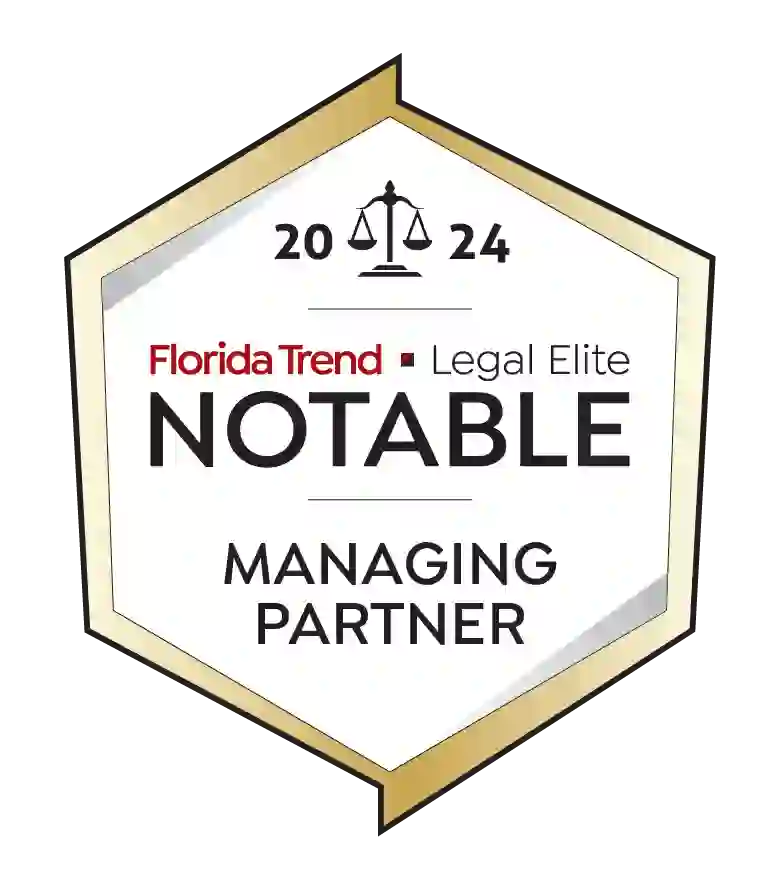
They were a great help with my probate case. From the initial consultation, they provided clear guidance and were incredibly supportive throughout the entire process. Their expertise made everything so much easier to handle. I highly recommend them for any probate matters in Florida. ... Read More
Monserratt Mayorga

This team exceeded our expectations in handling our family’s probate case. They were incredibly knowledgeable about inheritance laws and guided us through every step. Their compassion during this difficult time made a world of difference, ensuring we felt supported and understood throughout the process ... Read More
Joel Soto

I had an incredible experience working with this fantastic law firm! They helped me draft my will and trust, so I can leave my estate to my two gorgeous daughters because I want them to have a smooth and worry-free future. During our initial consultation, Jose explained everything in detail ... Read More
Yeshivah Simonson

It can be very difficult go through something you have no idea how to manage. But I’m so grateful because I found these amazing people which helped me with my probate case and they handled in the must professional way.Keep up the good work! ... Read More
Jose Velasquez

I cannot speak highly enough of the exceptional service I received from this law firm regarding probate law. After the passing of a loved one, I needed legal assistance with the estate administration, and they made a complex and emotionally charged process as smooth as possible. Their probate law team ... Read More
Maddy Castro

I'm located in California and I needed to do a Probate Law case in Florida, I was referred to this office and I'm glad I was, the consultation is over the phone which was so helpful on my situation, the attorney that talk to me during the consultation was so ... Read More
Alicia Carias

I had my consultation with the attorney Carling Freidzon for a Probate case, the attorney was able to explain how the office works and clarify my doubts regarding the case. I was so happy I found this firm and I decided to hire them. The attorney assigned to my case ... Read More
Joseph Gabriel Coello Gutierrez

I had the pleasure of meeting with Yudy on behalf of my mom for a free 30-minute consultation regarding some estate administration concerns. From the moment we spoke, it was clear that she is not only highly knowledgeable but also incredibly kind and patient. She took the time to listen ... Read More
Kristin Thakkar

The best law firm ever! Samah is such an incredible attorney. She was there every step of the way to help me with my legal issues. If you’re ever in need of legal assistance, this is the place to go to. I HIGHLY RECOMMEND!!!! ... Read More
Deanna Darwish

I received excellent counsel in developing a long-range plan for my Trust and final wishes. Very patient with my hearing difficulties and I appreciated that kindness! ... Read More
Aprell Davie

This law firm is the best in town! Very professional and quite helpful. They're always available, responsive, and on top of every single step. Samah deals with every case diligently and efficiently. Highly recommend this firm. Seriously, no need to look around, they're the best! ... Read More
Hanin Kamal

I had a fantastic experience with this firm. The team of attorneys was incredibly knowledgeable, professional, and attentive to my legal needs. From the initial consultation with attorney Jose to the resolution of my case, they provided excellent guidance and support. ... Read More
Corey Wright

We have trusted Florida Probate & Family law with several referrals on complex Trust litigation, Probate and Family law matters and they have always handed each client with excellence, professionalism and respect. We highly recommend their services ... Read More
Robinson Casey

I had the privilege of working with recently Samah, and I cannot speak highly enough of her exceptional service and expertise. From start to finish my experience with her team was truly outstanding. ... Read More
Kal Kader

Attorney Valeska Casanova- Chacon is an extraordinary human being and professional. She worked on my case from day one, willing to do what was best for me and my family. She is respectful, answered quick to all my questions and advised me with the best solutions for my case. I ... Read More
Melissa Castaneda

I'm very glad that I trust on this firm. The process of making a will to keep anything in order before something bad happens was very smooth and they're very patient and professional. ... Read More
Diego Bellino

I recently had the pleasure of working with The Florida Probate & Family Law Firm, and I wanted to share my positive experience. From the moment I contacted them, I was greeted with kindness and professionalism. The whole team was incredibly knowledgeable and took the time to understand my specific ... Read More
Anthony Avila

Highly recommended!! Samah, Jose, and the entire team is fantastic. I have worked with the firm in representing my most valued clients and they have been responsive, effective, and produced great results. Thank you helping my clients feel at ease and making the planning process a breeze! ... Read More
Kristina Wilson

The office was exceptional in every way. From calling and getting basic information on procedures , to sending forms in, to actually having the appointment , each step was clearly explained to me and so professional ! Everyone in the office was very kind and so helpful to meeting the ... Read More
Noor Masri

We contacted Attorney Jose Leon for advice on a Power of Attorney vs a will for my mother and he provided sound advice on how we could and should proceed forward. Thanks to his guidance, we were able to know our rights and the best way to move forward in ... Read More
Luis M Latour

I worked with Samah and her team, to anyone who needs a probate or family law attorney this is it. Lawyers returning my calls & emails promptly is important to me. They’re very organized; I had a consult with Samah and she listened to what I wanted including giving her ... Read More
John Smith

Samah literally came to my rescue! Days away from my husband having open heart surgery and me pregnant with our fifth child! Sadly, we had never made a will or a plan. Truly grateful for Samah coming to our aid. It gave me such peace knowing there was a plan ... Read More
Katherine Young

Samah Abukhodeir was recommended to us in early 2019 by our financial consultant. My husband and I wanted to create a will and other important documents. We were immediately comfortable with Sam personally and with her knowledge and expertise in meeting our needs to put together these papers for us. ... Read More
Joan Vassall

Attorney Krizia Toledo and the entire team were very professional. They took care of my case and gave me clear guidance. It is not the cheapest option but you are in good hands. ... Read More
Ricardo Abend Van Dalen

I’ve never had to deal with legal issues and Sam was excellent. Her office is well organized, responsive, and cares. Her paralegal and associates follow up and make sure that you understand how to fill out the initial docs and answer any questions you may have. I spoke to Sam ... Read More
Alaa-Aldeen Abukhdair

Sam and her team are great. We had a family emergency and they were able to help us after hours and the weekend to ensure everything was taken care of. Another firm would not have accommodated it but we were lucky to find a team that really cared and took ... Read More
Matthew

Super talented, professional, they know their job. Would never go to anyone only to the Florida Probate & Family Law firm exelent job Thank you so much ... Read More
Irma Haddi

Loved working with Yudy! She is really on top of her game and gets work done. She’s very responsive and I feel like she works all nonstop lol. Excellent work on my probate case, Yudy. Highly recommend! ... Read More
Neivis Roa

Sam and her staff are amazing. They are truly transparent throughout the entire process and make you feel valued at all times, from the beginning to the end. I would highly recommend Sam to anyone looking for professionalism and being assisted like family and not like another number in your ... Read More
Victor A.

From the beginning I felt welcomed. The intake team scheduled my call and listened carefully. Great staff, very communicative. They always take my phone calls and respond to my emails the same day. If you’re looking for an attorney that cares and is dedicated to helping you, you’ve come to ... Read More
Connie Mei

Samah and her team are very helpful and communicative. They have a very good understanding in probate and estate planning. You can tell everyone on the team is there to help with your problems. If you are looking for a probate attorney in Florida, look no further. They provided me ... Read More
Vance Johnson

Best firm in Miami! So helpful and honest. They really are on their A game! I was referred by my real estate agent and I couldn’t be happier with my decision to bring on Samah and her team. They listened carefully in every meeting we had and helped plan a ... Read More
Leah Valdes

I had an issue with a Probate case, and I had went to another attorney, but they were not helpful. I’m very thankful my cousin referred me to Samah and her team. I immediately got a response and they began work right away. They’ve communicated with me the whole time, ... Read More
Mohamed Abukhdair

I wholeheartedly recommend This Law Firm to anyone seeking legal representation. Their commitment to excellence, integrity, and client satisfaction makes them a top-notch law firm that you can trust with your most critical legal matters. ... Read More
Reem Kader

Sam and her team are excellent, highly responsive, and very skilled. I highly recommend them for any family law or probate legal issues. They will walk you through the process and take the stress off your plate. I regularly refer Sam and her firm cases and my referrals are always ... Read More
Thomas Graham

As a fellow legal professional, I’ve had the privilege of working with Samah on a matter for a family member. Her dedication to probate law is remarkable and her compassion for clients is truly commendable. She strikes an impressive balance between a keen legal mind and a caring, empathetic heart. ... Read More
Salman Salehjee

I recently had the pleasure of speaking to Melissa, who was so kind and professional. She helped answer all my questions and direct me to the correct people. I am so happy with the work that is done at The Florida Probate & Family Law Firm in Coral Gables. ... Read More
Jocelyn Gonzalez

I recently had the privilege of working with The Florida Probate & Family Law Firm for assistance with my father's probate case. From the first consultation, I was immediately impressed by the professionalism and knowledge of the team. They walked me through every step of the process and made sure ... Read More
Adam Khdair

I cannot express enough how amazing Samah is. As a probate attorney, she is highly skilled and knowledgeable. But what sets her apart is her extraordinary compassion and care. Her genuine empathy made a difficult process much more manageable. She provided a safe space where I felt comfortable sharing my ... Read More
Andres Palau

If you're searching for quality representation The Florida probates and family Law Firm would be the best choice. Samah would go above and beyond for her clients and is the rare attorney who takes the time to learn all the facts of your case. I couldn't be more grateful for ... Read More
Areej Yousef

Called for an initial consultation and I spoke with a young lady called Scarleth and she was very attentive and very respectful. She listened to me vent. She was truly a great first impression of this firm. Everything else ran so smooth! ... Read More
Miguel Lumbreras

I have dealth a couple of times with this law firm and would recommend it highly. Unlike others in the field, they take the time to understand your needs in order to address them professionally and efficiently. ... Read More
Felipe Cuza

I had a case that started simple, and became a horrible nightmare. This firm and Ms. Shapiro guided me with a steady hand and compassionate counsel through dark times. I can’t thank them enough. Highly recommend them. ... Read More
Thomas Claiborne

This firm handled my trust case efficiently. Their outstanding attention to detail were invaluable. I am very satisfied with the results obtained. ... Read More
Fernando Lainez

It was a pleasure working with this firm. Samah is an excellent attorney who is passionate about the work she does. Her fellow attorneys and staff were also extremely helpful through the whole process. The Florida Probate and Family Law Firm is an exceptional firm who truly cares about and ... Read More
Danni Mena

Samah was so friendly and extremely professional. She was able to precisely answer questions we had and point us in the right direction. I felt confident I was getting the same advice she would have given to a family member of hers. I’d highly recommend her for professional and legal ... Read More
Katie Young

I highly recommend Samah and her team to anyone who needs a probate or family law attorney. My experience with them was wonderful from start to finish; they were always great at returning my calls, responding to my emails. They’re very organized; I had a consult with Samah where she ... Read More
Ramie AlTawil

Let me start off by saying that I have nothing but AMAZING things to say about this law firm!! After firing my previous attorney (which was an absolute disaster), we decided to hire Florida Probate. Best decision ever! Krizia and Brenda listened to our needs, were knowledgeable and have executed ... Read More
Georgette Robaina

Had a consultation with Samah over the phone. She was so professional and extremely knowledgeable with the law. She guided me on what to do and how to proceed with my case. Her confidence and calmness won me over. She truly cares about her clients and is aggressive for positive ... Read More
Atheer Naif

We had a great experience with Samah and her staff. She was very transparent in what the process was going to be and the possible outcome. We are glad everything worked out well in the time that was initially estimated. We consulted with other firms before and they were all ... Read More
Franco Arias

Samah and her team were great. They helped us through a difficult legal matter and my wife was extremely impressed with the entire intake team of Yasmin, Beatriz, and Danielle. The attorneys and paralegals are also wonderful and truly care. Look no further. ... Read More
Ultra Beauty Supply































